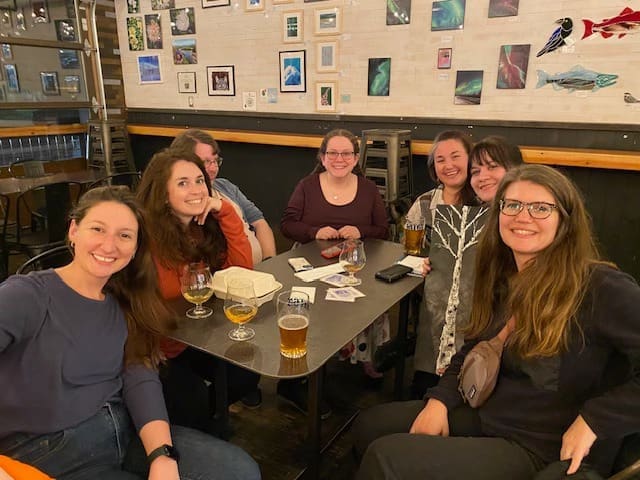The below post was written by Nicole Fiorino, Curator of Collections and Exhibits, Sitka Historical Society & Museum:
Empowerment Through Connection: Finding Confidence in Grant Writing

As someone new to grant writing and working at a small museum in a remote area, I often feel like I’m navigating this journey alone. In Alaska, opportunities to connect with other museum professionals are rare, and the challenges of working in an isolated environment can sometimes be overwhelming without local support.
Attending the 2024 Museums Alaska Conference in Fairbanks was an eye-opening experience for me, leaving me feeling more connected to Alaska, my colleagues across the state, and the purpose behind my work.
As someone new to grant writing and working at a small museum in a remote area, I often feel like I’m navigating this journey alone. In Alaska, opportunities to connect with other museum professionals are rare, and the challenges of working in an isolated environment can sometimes be overwhelming without local support. Attending the 2024 Museums Alaska Conference in Fairbanks was an eye-opening experience for me, leaving me feeling more connected to Alaska, my colleagues across the state, and the purpose behind my work.
A Space for Connection
One of the most valuable aspects of the conference was having a dedicated space to meet with other museum professionals. In an increasingly digital world, it’s easy to forget the power of face-to-face conversations. Meeting people in person who share similar struggles and successes in the field was incredibly motivating. As someone who usually works alone, I found it refreshing to be surrounded by peers and mentors—especially those who have worked in Alaska for many years.
Throughout the conference, I participated in several small group workshops, that were immensely helpful in building my knowledge and confidence. The diversity of skill levels and experiences within these groups meant everyone brought a unique perspective to the discussions. The collaborative atmosphere made me feel supported, knowing that we were facing similar challenges but were all learning and growing together.
Real-Time Feedback Boosts Confidence
One of the conference’s highlights was the Grant Writing Workshop led by Amy Steffian, who guided us through each stage of the grant writing process. Amy covered everything from getting started and finding grant opportunities to budgets and narratives, final reviews before submission, and even preparing for the possibility of setbacks. After Amy’s presentation, we had the opportunity to discuss potential proposals for each of our institutions and give feedback to other participants.
I shared a proposal to fund the conservation of a damaged Chilkat robe, a culturally significant textile for the Tlingit people requiring specialized care for display and ceremonial use. Staff and other attendees listened to my proposal and then helped me shape a clear goal and objective with several accompanying outcomes.
The feedback I received, especially from more experienced grant writers and former grant reviewers, was invaluable. They shared insights into the exact criteria reviewers use to make decisions which helped clarify the nuances of proposal writing. This experience gave me a much-needed confidence boost and reinforced the importance of reaching out for support and guidance.
Expanding My Knowledge Beyond Grant Writing
The grant writing workshop was just one part of a much larger learning experience. I also participated in sessions like “Decolonizing Curation and Exhibitions Discussion,” “Board Development,” “From the Ground Up: Building a Strong Foundation for Community Collaboration,” and “Speed Networking.” Each of these workshops addressed different aspects of museum work, from developing strong community partnerships to creating inclusive and thoughtful exhibitions.
In the “Decolonizing Curation” session, I learned more about the importance of centering Indigenous voices in museum work and how this can transform the way we present and care for cultural objects. The “Board Development” Session helped me understand how to strengthen governance at my museum, and “From the Ground Up provided practical tips for collaborating with community members.” The “Speed Networking” event gave me a chance to meet others in the field and build connections that I can rely on moving forward.
Moving Forward with Confidence
Attending the Museums Alaska Conference helped me see the bigger picture of what it means to work in the museum field in Alaska. It’s not just about working alone in my small museum—it’s about being part of a larger community of professionals who support one another. The feedback, connections, and skills I gained during the conference will be essential as I continue my work, especially in navigating the grant writing process and collaborating with my local community.
I’m leaving the conference feeling more empowered and motivated, not just in writing grants but in strengthening my role as a steward of cultural heritage in my museum. I highly recommend that anyone in a similar position seek out these kinds of opportunities—they are more than just learning experiences; they’re lifelines for those of us working in small, remote museums.